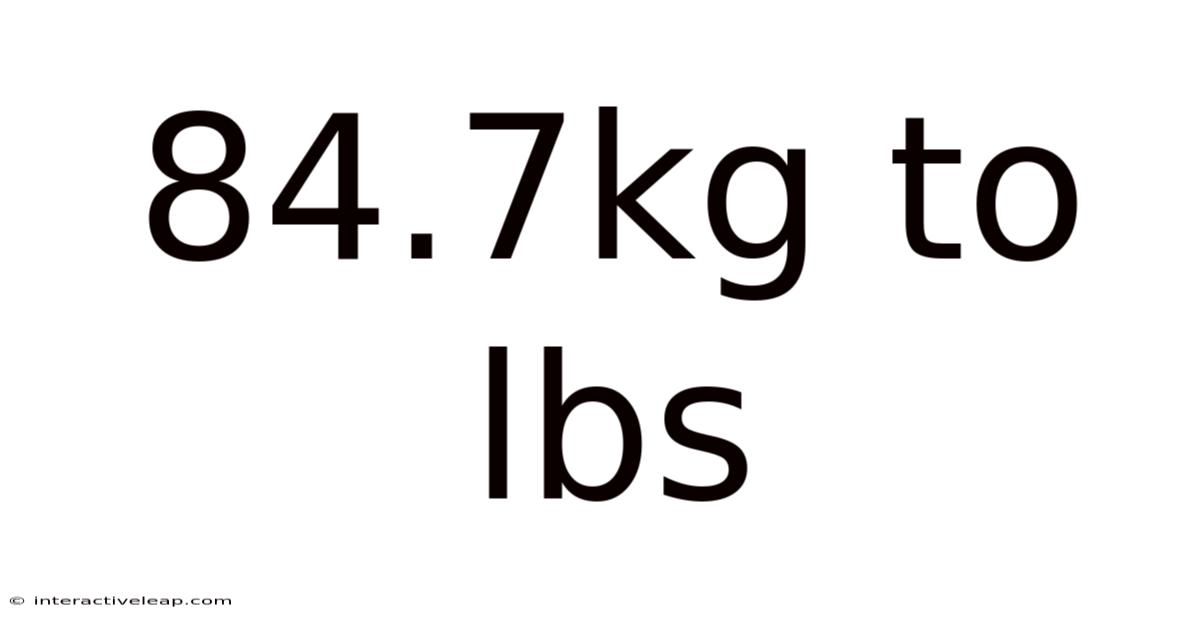84.7kg To Lbs
interactiveleap
Sep 25, 2025 · 4 min read

Table of Contents
Decoding the Conversion: 84.7 kg to lbs and Understanding Weight Measurement
Many people find themselves needing to convert kilograms (kg) to pounds (lbs), whether it's for travel, recipes, or simply understanding their weight in a different unit system. This comprehensive guide will not only show you how to convert 84.7 kg to lbs, but also delve into the history of these units, explain the conversion process in detail, address common misconceptions, and provide you with the tools to perform similar conversions independently. Understanding weight measurement transcends simply plugging numbers into a calculator; it's about grasping the underlying principles and appreciating the historical context.
Introduction: Kilograms, Pounds, and the Metric System
The conversion from kilograms to pounds involves switching between the metric system and the imperial system. The metric system, based on units of ten, is the predominant system globally, employing the kilogram (kg) as its base unit of mass. The imperial system, commonly used in the United States and a few other countries, uses the pound (lbs) as its unit of weight. While often used interchangeably, mass and weight are technically different; mass is the amount of matter in an object, while weight is the force exerted on that mass by gravity. However, in everyday usage, the terms are frequently used synonymously.
The key to converting between these systems lies in understanding the conversion factor: 1 kg is approximately equal to 2.20462 lbs. This factor is crucial for all kg to lbs conversions, regardless of the specific weight.
Calculating 84.7 kg to lbs: A Step-by-Step Guide
To convert 84.7 kg to lbs, we simply multiply the weight in kilograms by the conversion factor:
84.7 kg * 2.20462 lbs/kg ≈ 186.7 lbs
Therefore, 84.7 kg is approximately equal to 186.7 lbs.
However, for a more thorough understanding, let's break down the process:
-
Identify the conversion factor: As mentioned earlier, 1 kg ≈ 2.20462 lbs.
-
Set up the equation: We want to convert 84.7 kg to lbs, so we set up the equation: x lbs = 84.7 kg * 2.20462 lbs/kg
-
Perform the calculation: Multiply 84.7 by 2.20462. This gives us approximately 186.7 lbs.
-
Round to appropriate significant figures: Depending on the context, you might need to round the answer. For most practical purposes, rounding to one decimal place (186.7 lbs) is sufficient.
Beyond the Calculation: A Deeper Dive into Units of Weight
Understanding the conversion is only half the battle. Let's explore the history and nuances of kilograms and pounds:
-
The Kilogram (kg): The kilogram is the base unit of mass in the International System of Units (SI), the modern form of the metric system. It's defined as being equal to the mass of the International Prototype Kilogram (IPK), a platinum-iridium cylinder kept in Sèvres, France. The kilogram's definition has recently undergone a significant change, moving away from a physical artifact to a fundamental physical constant.
-
The Pound (lbs): The pound is a unit of weight or mass in the imperial and US customary systems. Its origins are rooted in ancient Roman units of weight. Over time, the pound's definition has evolved, leading to variations in its precise value. The avoirdupois pound, the most common type, is defined in terms of the kilogram.
Common Misconceptions and Troubleshooting
Many people stumble upon common mistakes during unit conversions. Let's address some:
-
Incorrect Conversion Factor: Using an inaccurate conversion factor is a frequent error. Always double-check the factor you're using to ensure precision.
-
Mixing Units: Ensure all your units are consistent before performing calculations. Don't mix kilograms with grams or pounds with ounces without converting first.
-
Rounding Errors: While rounding is necessary for practical applications, be mindful of the potential for accumulating errors, especially with multiple conversions.
Frequently Asked Questions (FAQ)
-
Q: Can I use an online converter for kg to lbs conversions? A: Absolutely! Many reliable online converters are available to simplify the process. However, understanding the underlying calculations is still beneficial.
-
Q: What if I need to convert a different weight, say 65.2 kg to lbs? A: Simply follow the same steps, replacing 84.7 kg with 65.2 kg in the calculation.
-
Q: Are there other units of weight besides kilograms and pounds? A: Yes, many other units exist, including grams (g), ounces (oz), stones (st), and tons (t). Each has its own conversion factors.
-
Q: Why is it important to understand unit conversions? A: Understanding unit conversions is crucial for accuracy in various fields, including cooking, engineering, medicine, and international trade.
Conclusion: Mastering Weight Conversions
Converting 84.7 kg to lbs, while seemingly straightforward, offers a window into the broader world of unit conversions and the historical context of measurement systems. By understanding the process, the conversion factor, and the nuances of kilograms and pounds, you gain a more comprehensive understanding of weight measurement. This knowledge empowers you not only to perform conversions accurately but also to approach similar problems with confidence. Remember, the key is consistent application of the conversion factor and attention to detail to avoid common mistakes. With practice, these conversions will become second nature. So, the next time you encounter a weight conversion, you'll be equipped with the knowledge and understanding to tackle it with ease.
Latest Posts
Latest Posts
-
Boron Electron Structure
Sep 25, 2025
-
4 4kg In Stone
Sep 25, 2025
-
Did Sasuke Die
Sep 25, 2025
-
12 5cm In Inches
Sep 25, 2025
-
10 Off 125
Sep 25, 2025
Related Post
Thank you for visiting our website which covers about 84.7kg To Lbs . We hope the information provided has been useful to you. Feel free to contact us if you have any questions or need further assistance. See you next time and don't miss to bookmark.